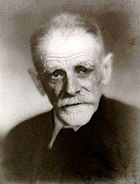|
Kostis Palamas
Kostis Palamas (Greek: Κωστής Παλαμάς; 13 January [O.S. 8 January] 1859 – 27 February 1943[1]) was a Greek poet who wrote the words to the Olympic Hymn. He was a central figure of the Greek literary generation of the 1880s and one of the cofounders of the so-called New Athenian School (or Palamian School, or Second Athenian School) along with Georgios Drosinis and Ioannis Polemis. BiographyBorn in Patras, in the same house as born the Italian novelist Matilde Serao,[2] he received his primary and secondary education in Mesolonghi. In 1877 he enrolled at the School of Law, Economics and Political Sciences of the University of Athens, but he soon abandoned his studies.[3] In the 1880s, he worked as a journalist. He published his first collection of verses, Songs of My Fatherland, in 1886. He was nominated for the Nobel Prize for Literature on 14 occasions, but never received it.[4] He held an administrative post at the University of Athens between 1897 and 1926. Palamas died on 27 February 1943, during the Axis occupation of Greece in World War II. His funeral at the First Cemetery of Athens on the next day became a major symbolic event of the Greek resistance against the occupation. In a service spontaneously attended by several thousand people, the funerary poem composed and recited by fellow poet Angelos Sikelianos roused the mourners and culminated in a major public demonstration of defiance of the occupying powers, whose representatives, come to lay a wreath at the poet's tomb, were greeted by the crowd with the Greek national anthem and shouts of 'Long Live Freedom'.[5][6] WorkPalamas wrote the lyrics to the Olympic Hymn, composed by Spyridon Samaras. It was first performed at the 1896 Summer Olympics, the first modern Olympic Games. The Hymn was then shelved as each host city from then until the 1960 Winter Olympics commissioned an original piece for its celebration of the Games, but the version by Samaras and Palamas was declared the official Olympic Anthem in 1958 and has been performed at each celebration of the Games since the 1960 Winter Olympics. HonorsThe old administration building of the University of Athens, in central Athens, where his office was located, is now dedicated to him as the "Kostis Palamas Building" and houses the "Greek Theater Museum", as well as many temporary exhibitions.    Palamas has been informally called the "national" poet of Greece. He was an influential voice in Greek literature for more than 30 years, and greatly influenced the entire political-intellectual climate of his time. Romain Rolland considered him the greatest poet in Europe. WorksCollections of poems
Prose
Theater
CriticismPalamas was one of the most respected literary critics of his day, and instrumental in the reappraisal of the works of Andreas Kalvos, Dionysios Solomos and the "Ionian School" of poetry, Kostas Krystallis et al. Translations
References
External links
|
||||||||||||||||||||

